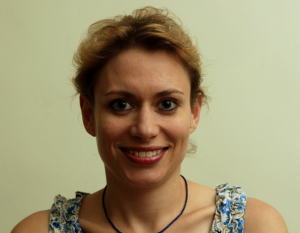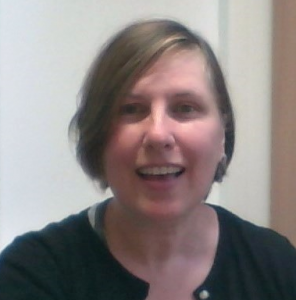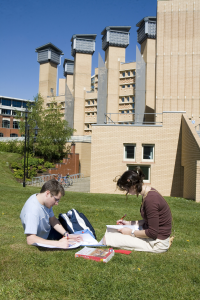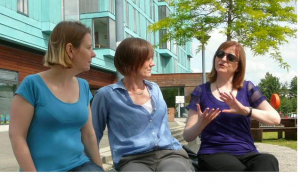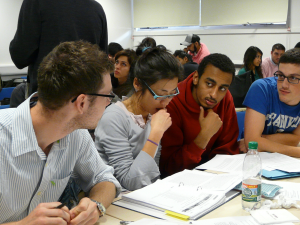Coventry University (England)
“Providing a Hub for Writing Development: A Profile of the Center for Academic Writing (CAW), Coventry University, England” Mary Deane and Lisa Ganobcsik-Williams
This profile essay outlines the work of the first centrally-funded UK writing centre, the Centre for Academic Writing (CAW) at Coventry University. The profile looks in detail at why and how CAW was established, and discusses the CAW model of a “hub” for three “spokes” of university writing development: student writing, staff development in the teaching of writing, and staff and postgraduate scholarly writing.
Queen Mary, University of London
” Thinking Writing at Queen Mary, University of London” By Teresa McConlogue, Sally Mitchell, and Kelly Peake
Royal Holloway, University of London (England) By Laura Christie
Royal Holloway is one of the UK’s leading research-intensive universities, with 21 academic departments and schools spanning the arts and humanities, sciences, social sciences, management, economics and law. Our 9,000 students learn from internationally renowned academics and researchers.
CeDAS – Centre for the Development of Academic Skills
The broad aim is to enable all undergraduates and postgraduate taught writers at Royal Holloway to achieve their full academic potential. Depending on the particular needs of the student, this means:
- enabling those new to university to acculturate to unfamiliar writing practices;
- helping writers to find their voice within a particular disciplinary community;
- providing language support to L2 writers so that they can communicate with greater fluency and accuracy on paper;
- supporting writers with particular learning differences.
CeDAS has responsibility for establishing a coherent view of writing provision and, to this end, is creating an ‘Academic Skills Hub’ on the student intranet, which aims to bring together all academic development services (including writing) in one place.
Undergraduates and postgraduates, both home and international, attend classes and sign up for 1:1 writing tutorials.Writing development at Royal Holloway is evolving quite rapidly. Within academic departments, the teaching of writing skills is becoming an increasingly important part of the curriculum, particularly for first-year undergraduates. In terms of centrally-provided writing services, provision for L2 writers remains significant given the large numbers of overseas students. However, the last few years has seen a move to address the needs of home students too through activities that aim to ease the transition from school to university writing; build confidence for writing in particular genres; and develop the skills needed to write with clarity and precision so highly prized by prospective employers.
Researcher Development Programme:
For the most part, doctoral students are separated from the main writing provision (CeDAS – Centre for the Development of Academic Skills) but collaborations and co-tutoring do occur. Academic writing is delivered to doctoral students on the Researcher Development Program. AS of 2016, we have 729 doctoral students, and just over 20% of the whole University cohort are international. The majority of international students I have tutored consider their first language to be Chinese, Iranian, and Arabian, while European students are from Greece France, Germany, Sweden and Italy. About half the students I advise are English speakers and struggles with writing occur around clarity of expression as well as grammar and language use. Sometimes students use their first year simply to adapt to a new environment with new challenges such as knowing what research is, how they can represent it and how it differs from their previous experiences.
Workshops aim to give students not only a structure and a basis for completing their thesis but to give options and ideas to develop their writing to become advanced research writers. Workshops ask students to either discuss their research or write their research in the class and gain peer and tutor feedback. Each class concentrates on a specific section of the thesis, e.g. introduction, literature review or methodology, with the aim of covering the basic information that students need to understand what goes into these sections, but also how they can adapt this template and form their own researcher identity in their chapters. Identity work is important in the workshops.
Other workshops not focused on the thesis help students to publish their work. These workshops are more specific to discipline and the primary goal is to support students with turning their academic writing within their thesis into publishable work. Tutorials with students look in-depth at their writing needs and struggles with the aim of helping them with any technical difficulties as well as helping them understand how a reader would view their writing. Reflexivity within their writing is encouraged.
The academic writing workshops seems to get students thinking about what they need to do next within their thesis. Feedback has indicated that the workshops clarify confusions, give students a greater sense of what is expected of them and motivates them to write differently and with more self-awareness. Usually tutorials are requested from attendees of the classes but success can be evidenced through supervisors sending their students to request tutorials. Struggles arise due to the generic nature of the classes. Although discipline specific classes were trialed I felt that when students from different writing cultures came together greater awareness was generated leading to more diverse and engaged discussions. Students seemed to gain more from talking to others outside their subject and learning about how writing is ‘done’ in other disciplines.


